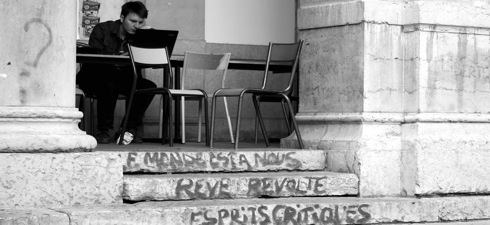"It’s not really anarchy, nor its opposite, but it’s close," explains Edouard Piron, 22, a student at the University of Lyon 2. Since spring 2009, a new educational modelcalled the "self-governed university" has been established. Two projects were initiated in the south-eastern French city after a long battle against the university reform law LRU proposed by the education minister Valérie Pécresse. "We got the impression that the battle wasn’t achieving anything. Many students wanted to propose an alternative to the law and the existing system," Piron explains.
You all learn, you all teach
That’s how theLyon Zero university (université partagée in French), of which Edouard Piron is a member, and the self-governed university (UA, l’Université autogérée) were born in May 2009. Lyon Zero has an associative status, a legal management team and tries to work in partnership with Lyon 2 University. It claims not to want to alter the classic university model, but offer a choice between this model and more mutual learning. In name itself, it goes against usual university names like Paris I, Paris II. Meanwhile, Lyon Zero plans to be entirely autonomous. Two concepts are essential - the absence of hierarchy and the sharing of knowledge, which Piron explains are otherwise "consumed and diffused in a unilateral way. We want a system in which everyone learns and everyone teaches, because we all have knowledge to share. The problem is that at university you study with the sole motive of finding a job. We don’t want to supplant this aim, but to also help people learn just for the joy of knowledge."
In such a system, motivation replaces rules and self-assessment grades, as in the Steiner-Waldorf school model, named after the Austrian philosopher Rudolf Steiner who pioneered a more imaginative, co-educational system. However, this is not to say that rules are absent. "At the beginning they’re necessary and later, when the project’s working, we remove them," says Piron. As far as "Lyon Zero" members are concerned, there is no aim to replace the traditional system. "We want to show another, complementary way." Like their courses, which are complementary to traditional teaching. "The type of lesson you have depends on the people who participate. Therefore, since we are alternative, the subjects are newer and have never been previously covered at university." Some examples of the subjects tackled are the concept of time and speed, gender discrimination, the micro-politics of groups, contemporary dance and nomadism. "You can always study a topic together, do some collective research and then discuss it together."
Other offshoots
In France the experiences of similar projects have been diverse and often short lived. At the beginning of the student movement against the LRU in November 2007, the "self-governed training and research unit (UFR)" was created at Paris 3. In November 2008 it was the turn of the "UFR Zero" at Paris 8. A year later, when Italian students and researchers brought their classes to the streets and piazzas, their Parisian colleagues created the "Paris 14 University", the last university establishment "after the creation of Paris 13 in 1971". Like the automatically-run Parisian metro line 14 that it is named after, the university "has neither driver, nor president, nor workers. It’s autonomous, self-sustaining. Critical, nomadic and open to all," says Guillaume Lachenal, a research assistant at Paris 7 and member of Paris 14. Its current academic calendar is a blank slate, but that doesn’t mean the dream is over: ‘We’re not dead,’ says Guillaume Lachenal. ‘We’ve slowed down for a time considering the absence of general strikes these days.’
Andrea Giambartolomei (Translation - Leila Reid)
IN GERMANY
Too radical to serve the movement
On 12 November, students occupied a number of lecture halls at German universities (Berlin, Hamburg, Munich, Heidelberg), calling for better study conditions, free tuition and the democratisation of higher education. An identical movement has hit Vienna, where students have been staging a sit-in for three weeks in the main auditorium. The German education minister has asked his counterparts in the Länder to implement the final academic reform and ease up on the undergraduate curriculum (for a Bachelor degree under the Bologna system), which is deemed too heavy. The Süddeutsche Zeitung says these spectacular protests are counter-productive – and lack unanimous support from the student body. What with those who want to study in peace to contend with along with those who are discontent but reject “activism of a professional revolutionary cast”, the movement remains fragile. The daily calls on students to liberate themselves from both “curricular inadequacies and the demands of unappeasable radicals”.
Was this article useful? If so we are delighted!
It is freely available because we believe that the right to free and independent information is essential for democracy. But this right is not guaranteed forever, and independence comes at a cost. We need your support in order to continue publishing independent, multilingual news for all Europeans.
Discover our subscription offers and their exclusive benefits and become a member of our community now!












